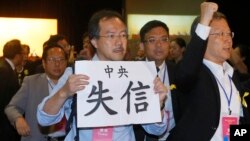The British government, trying to defuse a row with China over Hong Kong, has welcomed a Chinese declaration that Beijing intends eventually to allow the former British colony to elect its leader by universal suffrage.
Britain handed Hong Kong back to China in 1997 under an agreement which said it could keep its wide-ranging freedoms and autonomy.
But pro-democracy activists say a Chinese decision to tightly curb nominations for a 2017 leadership vote means Hong Kong risks ending up with a “fake” democracy.
This week, the Chinese government defended its decision to limit nominations for the post of Chief Executive.
“The method for selecting the Chief Executive shall be specified in the light of the actual situation in [Hong Kong] and in accordance with the principle of gradual and orderly progress,” it said in a statement.
But it added: “The ultimate aim is the selection of the Chief Executive by universal suffrage...”
Tensions between Britain and China have risen since parliament launched an inquiry in July into whether China and Britain's joint declaration on the transfer of sovereignty over Hong Kong to China is being implemented.
Both the Chinese ambassador to Britain and the National People's Congress Foreign Affairs committee have demanded the inquiry be shelved.
On Thursday the British Foreign Office said it recognized there was no ideal model for the election.
“We welcome the confirmation that China's objective is for the election of Hong Kong's Chief Executive through universal suffrage,” it said in a statement.
“While we recognize that there is no perfect model, the important thing is that the people of Hong Kong have a genuine choice and a real stake in the outcome,” it added.
Asked about the statement, a spokesman for China's Foreign Ministry expressed “strong dissatisfaction” with Britain's position.
“Hong Kong is a special administrative region of China, and that Hong Kong's political reform is China's internal affair,” said ministry spokesman Qin Gang. “No foreign country is entitled to make improper comments or intervene in any way.”
The Foreign Office said it recognized that China's restrictions on the 2017 election would disappoint democracy campaigners arguing for a more open nomination process.
“We hope that the next period of consultation will produce arrangements which allow a meaningful advance for democracy in Hong Kong, and we encourage all parties to engage constructively in discussion to that end,” it added.
Britain's relations with China took a nosedive in 2012 after Prime Minister David Cameron met the Dalai Lama, the Tibetan spiritual leader whom Beijing says is a separatist.
Ties had mostly recovered before the latest spat over Hong Kong. Cameron visited China last year and Chinese Premier Li Keqiang flew into Britain in June on a trip that sealed billions of dollars of trade deals and advanced London's push to become an offshore yuan trading hub.





